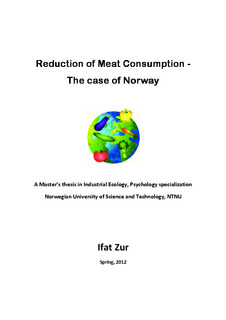| dc.contributor.advisor | Klöckner, Christian | nb_NO |
| dc.contributor.author | Zur, Ifat | nb_NO |
| dc.date.accessioned | 2014-12-19T14:42:34Z | |
| dc.date.available | 2014-12-19T14:42:34Z | |
| dc.date.created | 2012-11-05 | nb_NO |
| dc.date.issued | 2012 | nb_NO |
| dc.identifier | 565298 | nb_NO |
| dc.identifier.uri | http://hdl.handle.net/11250/270906 | |
| dc.description.abstract | This paper integrates aspects of the disciplines of Industrial Ecology and Psychology regarding the behaviour of meat consumption, with a particular focus on the substantial contribution of the meat industry to severe environmental impacts. Based on the theory of planned behaviour, norm activation theory and protection motivation theory, a model was formed to find the barriers and facilitators for a reduction of meat consumption in Norway. A questionnaire study to test this model included 209 participants in Trondheim, Norway. The results showed that the predictors for such reduction are intention, health beliefs, attitude, and the general approach towards environmental issues, while meat eating habits form a barrier. The paper discusses several reasons for a reduction of meat consumption, including moral aspects, health aspects and environmental impacts, as well as several intervention tools and strategies for enhancing such reduction on individual and institutional scales. | nb_NO |
| dc.language | eng | nb_NO |
| dc.publisher | Norges teknisk-naturvitenskapelige universitet, Fakultet for samfunnsvitenskap og teknologiledelse, Psykologisk institutt | nb_NO |
| dc.title | Reduction of Meat Consumption - The Case of Norway | nb_NO |
| dc.type | Master thesis | nb_NO |
| dc.source.pagenumber | 121 | nb_NO |
| dc.contributor.department | Norges teknisk-naturvitenskapelige universitet, Fakultet for samfunnsvitenskap og teknologiledelse, Psykologisk institutt | nb_NO |
